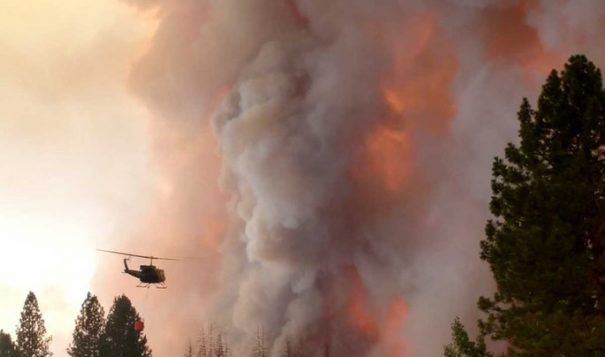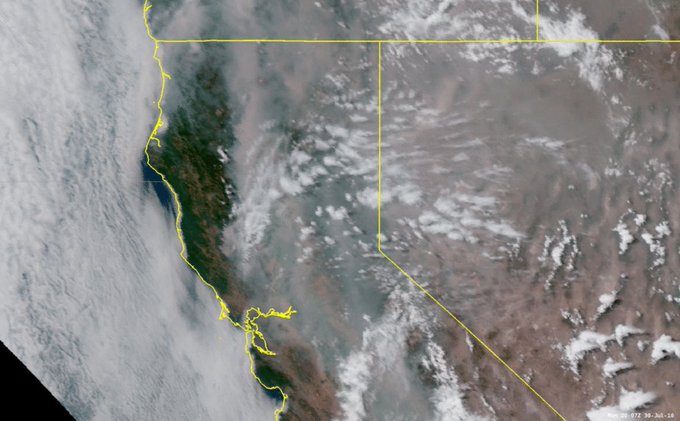Wildfire smoke and haze continues to blanket much of interior #NorCal today. Many locations seeing reduced visibility and air quality #CarrFire #RanchFire #RiverFire #MendocinoComplex #cawx
 Ferguson Fire photo via Cal Fire PIO on Twitter.
Ferguson Fire photo via Cal Fire PIO on Twitter.
Nearly a hundred major wildfires continue to burn across the United States, threatening lives and health in 14 states, as well as six provinces and two territories in Canada. In the course of fighting the fires, five firefighters have died battling the fires, four in California and one in Ontario.
“Large fire activity continues across most of the West, Florida and Alaska, where 98 large fires have burned 1.2 million acres,” reports the National Interagency Fire Center. “More than 26,000 firefighters are assigned to these incidents. Another day of very hot temperatures and possible thunderstorms will continue to challenge suppression efforts.”
There are some 145 wildfires in British Columbia and 68 in Ontario, according to the Canadian Interagency Forest Fire Centre. Last year was British Columbia worst fire season ever, forcing some 65,000 people from their homes and burned a record-setting 12,000 square kilometres of land. The province was under a state of emergency for 10 weeks. “The potential for emerging significant wildland fires is such that resource demands are expected to continue or increase,” says the fire centre.


In California, some 17 wildfires have forced thousands to flee, including tribal members from at least a dozen tribal nations. Tribal casinos in safe areas have opened their doors to displaced tribal members.
Here’s what is known in California so far. (Remember to look for updates in local media. Fire conditions can change quickly and put people in immediate danger.)
The Carr Fire forced the evacuation of the Redding Rancheria on Monday, July 30. The fire has burned 98,724 acres and is 20 percent contained, according to the California Department of Forestry and Fire Protection. However, the BIA Forestry and Fire Management – Pacific Region’s Facebook says tribal citizens at Redding are no longer under evacuation.
Residents of the Agua Caliente Band of Cahuilla Band of Indians in Palm Springs have been forced to evacuate due to the approaching Cranston Fire. The 56,000-acre Mendocino Complex fire has forced the evacuation of the Yokayo Rancheria, Upper Lake Rancheria, Big Valley Rancheria, Redwood Valley Rancheria, Potter Valley Rancheria, and Robinson Rancheria of Pomo Indians.
The evacuation advisory for the Hopland Rancheria threatened by the Mendocino Fire was lifted July 30. The Ribbon Fire on the Santa Rosa Reservation evacuation notice has been lifted, as has the evacuation notice for residents of the Torres Martinez Desert Cahuilla Indians.
“Other tribes are likely affected,” said E.J. Crandell, tribal chairman of the Robinson Rancheria, but he was drawn away from an interview by emergency responders. Crandell said a group of their tribal members stayed back to help, digging fire lines and wetting areas down.
“The United Pomo Nation Council organized a Fire Relief Fund last year to assist tribes in northern California impacted by wildfires, and it is still active,” Crandell said. Donations can be made through their GoFundMe site.

The BIA forestry team says it was grieving over the loss of Captain Brian Hughes of the Arrowhead Interagency Hotshots. Hughes died fighting the blaze near Yosemite National Park.
In Northern Ontario, a First Nations firefighter from Alberta, Jerry Gadwa, was killed in the line of duty. “There’s obviously a lot of shock because a lot of people got along good with him,” Kehewin Cree Nation Council Member William John told CBC Indigenous. “In our community, we have a lot of people that enjoy… humor, a lot of sharing laughs.”
And Alberta’s premier Rachel Notley said Friday: “We are one country and we look out for one another. Mr. Gadwa and his fellow firefighters were in Ontario fighting to defend the well-being of their fellow Canadians … The sacrifice they and their families make is extraordinary and is felt heavily in hearts throughout Alberta and across Canada.”
In Washington, The Yakama Nation enacted a reservation-wide ban on all outdoor burning. A news release Monday said the nation based the decision on information provided by the tribe’s fire management team and the National Weather Service because of low humidity and gusty winds.
The Colville Tribal Tribune reported that fire danger level remains set at high. “Traditional burns and recreational burns, in designated campsites, are allowed through burn permits.”
Montana’s Char Koosta News, published by the Confederated Salish and Kootenai Tribes, also reported a fire warning at “very high.”
“After a wet spring, fuels have dried to the point that fires will spread quickly,” the News said. “Last week, unattended campfires, illegal debris burning, operating internal combustion engines around cured grasses, and tow chains dragging on highway surfaces have ignited wildfires.”
Editors at Indian Country Today contributed to this report.

